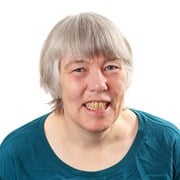Annah Thembeka Chaldien grew up ten thousand kilometres from Trondheim in a South African township – one of many underdeveloped apartheid-era urban reservations for non-whites. Now she is experiencing the spring-like winter of mid-Norway's capital.
Annah is an exchange student working towards a master's degree in the field of materials science. On behalf of SINTEF and NTNU, she is contributing her skills to a Norwegian industrial knowledge-building project devoted to technology for achieving greener metal production.
This is all part of a career choice that Annah never would have hoped for as a child, even though she dreamt of being a chemist.
Winning over all the odds
"I come from a very low-income family, so when I was growing up it was unthinkable that I would ever study at university," she tells us.
But Annah managed just that.
Recently one of her female compatriots was rewarded with a peace prize in Trondheim for work dedicated to opening doors for up-and-coming and previously underprivileged young people like Annah.
Equal opportunity for education – irrespective of background
On Friday 15 February, South African Fashia Hassan received the Student Peace Prize in Trondheim at an award ceremony that forms part of ISFiT, the world's largest international student festival.
She received the award in recognition of her efforts to achieve equal opportunity for everybody seeking admission to South African universities. Last year the country initiated a scholarship scheme to subsidise higher education for working-class youth and others of limited means.
"The scheme is one of the results for which the foundation was laid down by prize-winner Fashia and her student movement as early as 2015," Annah explains.
Battle against student fees
However, all students in South Africa still have to pay high student fees to obtain a university place, and the prize-winner has fought tirelessly against these fees.
To a large extent, the battle is about making the threshold to higher education the same for rich and poor – in a country where, according to statistics from 2017, the white minority earn on average five times as much as the black population.
Wants to help her family
Annah says that she will use much of the income that she can now look forward to as a university graduate to help her family, and not least to assist her younger siblings in obtaining an education.
She arrived in Trondheim with her fellow student Julian Johannes Jacobus Venter (26) who will be taking part in a related knowledge-building project.
"Although I am white, I also grew up in poverty," Julian tells us. "My father was a mine worker when I was born, but he worked hard and succeeded in becoming a lawyer. He has paid for my education, but now it's time for me to pay something back – and yes, I mean to my father."
A step forward
The two young South Africans agree that equal opportunity in education for everybody will be an important step towards better living conditions in their home country.
However, both Annah and Julian point out that widespread corruption must be eradicated, and that the quality of elementary schools must be improved if the development of South Africa is to really accelerate.
Greener metal production
Both of them are students at North-West University, about 100 kilometres by road from Johannesburg.
The exchange visit is part of a research collaboration that SINTEF/NTNU and South African technical communities have pursued for several years. The theme of the collaboration is the search for methods for reducing energy consumption and greenhouse gas emissions associated with metals production.
NTNU professor Merete Tangstad, the two students' tutor, explains: "Both Norway and South Africa are world-leading metal manufacturers. We have a lot of energy, but not much ore. They have a lot of ore, but not much energy. So in our technical field the two countries have much to teach each other.
Written by Svein Tønseth


